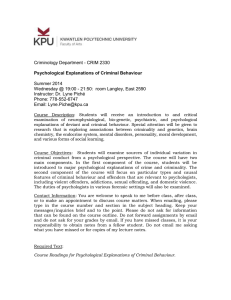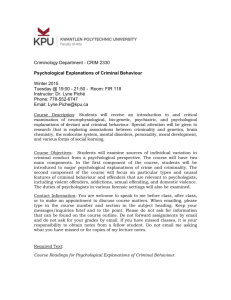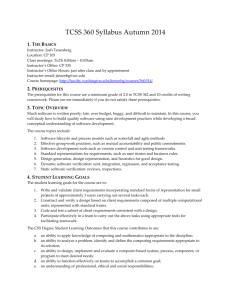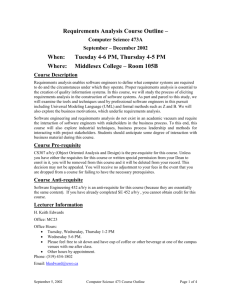piche crim 2330
advertisement
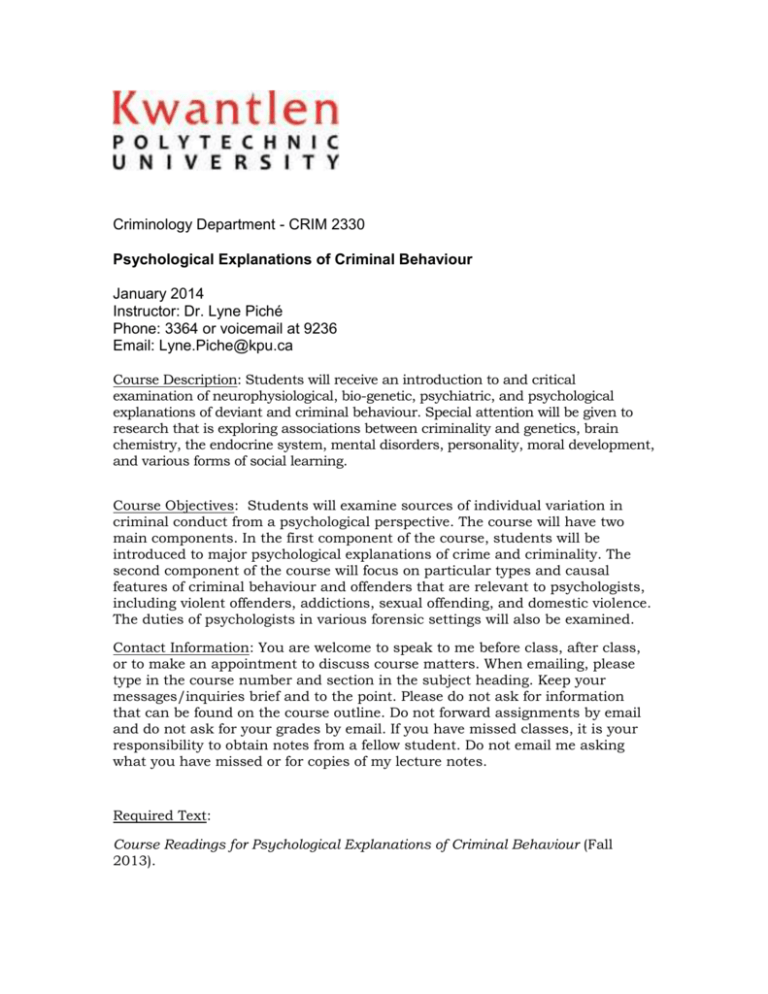
Criminology Department - CRIM 2330 Psychological Explanations of Criminal Behaviour January 2014 Instructor: Dr. Lyne Piché Phone: 3364 or voicemail at 9236 Email: Lyne.Piche@kpu.ca Course Description: Students will receive an introduction to and critical examination of neurophysiological, bio-genetic, psychiatric, and psychological explanations of deviant and criminal behaviour. Special attention will be given to research that is exploring associations between criminality and genetics, brain chemistry, the endocrine system, mental disorders, personality, moral development, and various forms of social learning. Course Objectives: Students will examine sources of individual variation in criminal conduct from a psychological perspective. The course will have two main components. In the first component of the course, students will be introduced to major psychological explanations of crime and criminality. The second component of the course will focus on particular types and causal features of criminal behaviour and offenders that are relevant to psychologists, including violent offenders, addictions, sexual offending, and domestic violence. The duties of psychologists in various forensic settings will also be examined. Contact Information: You are welcome to speak to me before class, after class, or to make an appointment to discuss course matters. When emailing, please type in the course number and section in the subject heading. Keep your messages/inquiries brief and to the point. Please do not ask for information that can be found on the course outline. Do not forward assignments by email and do not ask for your grades by email. If you have missed classes, it is your responsibility to obtain notes from a fellow student. Do not email me asking what you have missed or for copies of my lecture notes. Required Text: Course Readings for Psychological Explanations of Criminal Behaviour (Fall 2013). Any additional readings that are assigned will be made available by the instructor. Course Readings & Lectures: A summary of the course topics and a list of preliminary required readings are provided below. In addition to readings from the textbook, there may be scholarly articles, newspaper articles, and handouts, etc. assigned to students as part of the required course readings. Lectures and reading assignments are designed to complement one another and facilitate student learning of the course material. To maximize success in this course, students need to attend class lectures regularly and complete pre-assigned course readings before lecture. The lecture material will not necessarily review or cover the assigned readings. Individual written assignment (10%): The purpose of this assignment is to think conceptually, creatively, and critically about this course. Begin with the premise that if I were to teach a class or a topic for the Psychological Explanations of Criminal Behaviour course I would: (for example) discuss the following topic(s) and or theories: incorporate research and or methodological issues pertaining to: show the documentary (or documentaries), or film(s): review the profile(s) of the following offender(s): expand on the material by: You need only choose one of the these ideas. Regardless of the idea(s) you have, you need to explain your rationale and or support/quantify them by incorporating information from at least five different references (i.e., articles, books) in addition to the source of your idea (i.e., film, documentary, novel, profiles). You will need to not only discuss your idea(s) but also when and how you would incorporate the material into the course. The assignment will evaluated according to its creativity, rationale, merit, and critical analysis. Reiterating what has covered in class will not earn a favourable evaluation/grade. Group research Assignment (25%): The purpose of this assignment is to provide an integrated review of the research in area of the Psychological Explanations of Criminal Behaviour. Your research paper must be based on at least ten peer reviewed research based articles (Wikipedia and the internet articles are not acceptable sources). This assignment will be completed in teams of 3 to 4 students. Examples of acceptable research topics/questions: 1. Can or should psychopathy be diagnosed/classified in children or adolescents? 2. Develop a reasonable treatment plan for a violent psychopathic male with appropriate justifications of your treatment modules. 3. In what circumstances can pornography lead to sexual aggression? 4. When does having a mental illness increase the probability of violence? 5. What are the difficulties associated with the assessment of sexual deviance? 6. In what instances, can violent and or sexual recidivism be predicted? These paper topics address specific questions. Other research questions may be appropriate but need to be approved by your instructor beforehand. You must attach copies of the abstracts of the articles cited in your paper with your paper. Technical Requirements: Your assignments should conform to the American Psychological Association (APA) referencing style. There is a helpful APA referencing style information sheet that may be obtained the CRIM 2330 course website or from Kwantlen’s library. You should use a Times New Roman, font size 12, with 1 inch margins on all sides of your paper. Include a title page with your names, student ID, course number, and educational institution. Please do not use plastic binders. In Class Group Assignments (15%) For some topics, questions based on the readings and or other course material will be handed out in-class. It is important that you bring your course reader to class. You will be given time in class to answer the question(s) and hand in a written group response and the assigned questions will assist in preparing for the exams. Students who miss classes where group assignments are handed out will not be able to make up the missed assignment marks. Examinations Midterm quiz (25%) Final quiz (25%) There are two examinations in this course. Each will consist of a variety of question formats (e.g., multiple choice, short answer questions, fill-in-theblanks, longer essay-type questions). All material assigned to students for study outside of class as well as material presented in class is examinable including lectures, assigned readings, class discussions, videos, etc. It is your responsibility to attend classes to obtain information discussed in class. Both examinations will be closed book. Grade Assignment Letter grades will be assigned will be based on your performance in fulfilling the requirements listed above. Letter grades will be assigned as follows: A+ = 90 to 100 B+ = 76 to 79 C+ = 64 to 67 A = 85 to 89 B = 72 to 75 C = 60 to 63 A- = 80 to 84 B- = 68 to 71 C- = 56 to 59 D = 50 to 55 F = 0 to 49 Policy On Late Assignments And Missed Exams: Assignments are due in class on the assigned date. Assignments that are not handed in to the instructor before the end of class on the assigned date will be considered late and penalized 2 marks per day. I will not be responsible for papers that are not handed to me personally. Assignments that are not received by the instructor within seven days of the due date will not normally be marked unless prior arrangements are made with the instructor. Extensions will be granted only in exceptional circumstances. Students requesting an extension must be prepared to provide satisfactory documentation concerning the nature of their circumstances. For your own protection, you must retain both your research notes and a hard-copy of your papers, and must be able to produce them when requested. Disk or computer failure is not a legitimate excuse for not having a back-up copy of your notes or final paper. Students who miss a scheduled examination due to a serious medical or family emergency may be permitted to write a make-up examination. Students should contact the instructor in advance of their expected absence to explain the nature of their circumstances and to make alternative arrangements. Students who are unable to provide documentation satisfactory to the instructor supporting the nature of the circumstances surrounding their absence from an examination may be given a grade of zero. Plagiarism and Cheating Definitions: Cheating, which includes plagiarism, occurs where a student or group of students uses of attempts to use unauthorized aids, assistance, materials, or methods. Cheating is a serious educational offence. Plagiarism occurs where a student represents the work of another person as his or her own Examples of Plagiarism: Borrowing the ideas, theories, illustrations, lab data, or language of others, in whole or in part, without properly quoting and citing the source within the text of the paper Substantially paraphrasing without acknowledging the source, even though you have used your own words Using synonyms to change words within a phrase or sentence derived from another source and then treating the phrase or sentence as if it were your own Submitting an assignment, in whole or in part, that was previously graded in another course whether or not the other course was taught at Kwantlen Note that Kwantlen instructors have access to and to the Essay Verification Engine Version which is a tool used to detect plagiarism both from published and web materials. Summary Individual Written Assignment (10%) Group Research Assignment (25%) In class Group Assignments (15%) Midterm (25%) Final (25%) SCHEDULE WEEK 1 DATE January 9 SUBJECT Introduction Required reading 2 January 16 Biology Required reading 3 January 23 Biology – Gene and environmental interactions Required reading 4 January 30 Developmental pathways Required reading 5 Feb 6 Learning and the Social environment Individual Written Assignment Due today Required reading 6 7 8 9 Feb 13 Feb 20 Feb 27 March 6 Required reading Reading Week – No class Midterm Personality Disorders Psychopathy 10 March 13 Mental Disorders and Dangerousness Required reading 11 March 20 Substance Abuse and Economic Crime Group Research Assignment Due today Required reading 12 13 March 27 April 3 Violence and Homicide Sexual Offenders Required reading 14 April 10 Final
